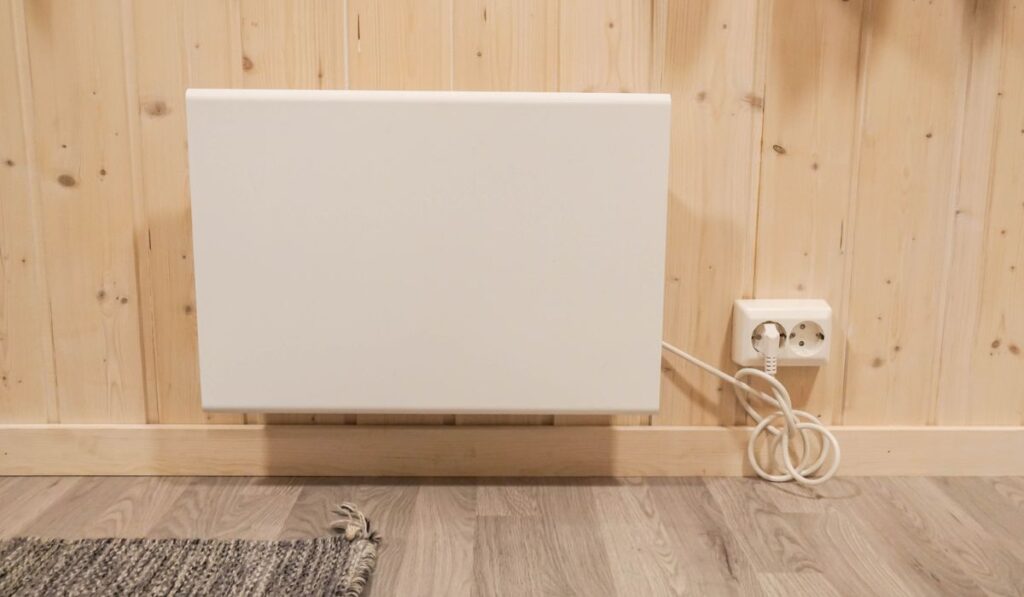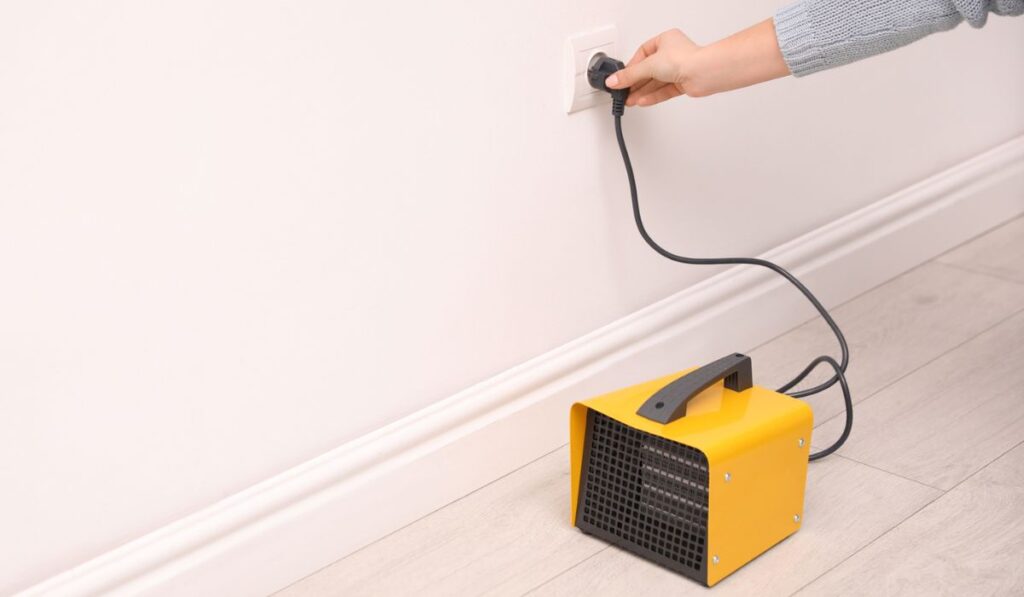Space heaters are a great way to stay warm in the winter when you live in a cold climate. But it can be a struggle in smaller homes to find a place to plug them in, and you may be wondering if you can plug your space heater into a surge protector.
You should never plug a space heater into a regular surge protector as they are not built to withstand the level of electricity a space heater emits. If you want to use a surge protector with your space heater, buy a heavy duty one with its own fuse, designed for this kind of service.
Curious about the other dos and don’ts of surge protectors? Let’s look at the right way to use a surge protector as well as some alternative ways you can keep warm this winter.
Surge Protectors and Space Heaters: Are They Safe to Use Together?

Brining a space heater into your home is already quite dangerous, and plugging one into a surge protector makes it more dangerous. A space heater often creates too much electricity for a standard surge protector to handle.
Although surge protectors have a built-in electrical spike protector designed to stop large energy spikes, these protectors can only handle about 750 joules of energy in one spike. When a space heater spikes, it can produce up to 5,000 joules in a single spike–which is five times your surge protector can withstand.
Therefore it is best to plug your space heater directly into the wall outlet. If this means you need to move your furniture around and plug a different appliance into your surge protector, you should do it. It only takes one space heater fire from a surge to cause massive damage to your home.
Are Some Surge Protectors Safer Than Others?
Surge protectors come in several levels, some of which are safer to use with large appliances than others.
The lowest level of surge protector is typically the cheapest, and these are the ones that only protect for up to about 700 joules of power. So they will not offer enough protection to use with a space heater.
Heavy-duty surge protectors may offer enough protection to be used with a space heater. However, these surge protectors tend to be large and are typically only used with construction equipment.
But if you can find one safe for up to 5,000 joules of energy, this surge protector is safe to use with your space heater. Just read the owner’s manual before plugging your space heater in to ensure the surge protector doesn’t specifically mention not using your space heater with their product.
Safer Alternatives to Using a Surge Protector
As you can see, you will not likely find a surge protector capable of using your space heater. However, below are some other alternatives you can use instead of using your space heater with a surge protector.
Plug Your Space Heater Directly into the Wall
The best way to use your space heater is by plugging it directly into the wall. Therefore, before purchasing one, you should ensure you have space in your home where you can put the space heater, and the cord will connect directly to the wall.
Space heaters come in different shapes and sizes, so don’t be afraid to shop around to find one that fits your available space.
Plug Other Appliances into the Surge Protector
If you are using your space heater in your office, you might find that you don’t have room in the outlet because you have other appliances (like your computer) plugged in. In this case, consider plugging your computer into the surge protector and allowing the open spot in the outlet to go to your space heater.
Surge protectors are meant to be used with computers anyway, so there is no reason not to plug them in using one. You should also plug-in lamps, printers, and your wifi modem through the surge protector, leaving the outlet free for your space heater.
Surge Protectors vs. Power Strips
Despite what some people may think, not all surge protectors are the same. Not only that, but power strips and surge protectors are not the same things and offer differing levels of protection to your home.
A power strip is a long cord that ends in a rectangle with 5-6 outlets. While these devices contain a circuit breaker that will go off if a large amount of electricity tries to pass through, they do not offer any protection against power surges.
Surge protectors, on the other hand, are typically boxlike, and sometimes they plug directly into the wall without any cord. They are not lightweight like power strips and will have grounding wires to dispel excess electricity.
The added bulk to a surge protector may seem inconvenient, but it is critical to protecting your home and devices from excess power. You should never plug a space heater into a power strip.
Advice for Safely Staying Warm this Winter

Space heaters can be scary devices, especially when your only option to plug them in is through a power strip or surge protector. Here are some other options for staying warm during the chilly winter days.
Invest in a High-Quality Space Heater
Not all space heaters are hazardous; many have been designed with safety features in this modern world. For example, some shut off automatically when tipped, while others have a circuit breaker that won’t allow them to overheat.
If you have kids or pets, you may also want to look into those that have a covering that doesn’t conduct heat. These space heaters also come with an automatic shut-off, so you don’t have to worry about leaving them on when you leave home.
Before you purchase a space heater, do your research. It may cost a little more to buy a space heater with safety features, but it could save you from some expensive damage in the long run.
Use a Heating Blanket
These great inventions are called heating blankets, which can be plugged into a surge protector, power strip, or even an extension cord. Unlike space heaters, they draw much less electricity and are less likely to start a fire.
Additionally, most electric blankets have automatic shut-off devices ensuring they don’t overheat; some even allow you to pick the desired heat level. Consider tossing one of these over your lap while at your desk instead of purchasing a tabletop space heater.
Heating blankets are also typically safe for children because they do not get as hot to the touch as a space heater. Check your specific heating blanket for pet safety before purchasing one if you have pets in your home.
Warming Pouches
If you live somewhere with a short winter, it may be worthwhile to grab some warming pouches. They can typically be purchased at a hardware store in bulk for cheap.
Warming pouches can be placed in your shoes or under a blanket on your lap and can help keep you warm as you work. Some need to be cracked and shaken to activate, while others, typically reusable, work by being heated in the microwave.
Warming pouches only keep you warm for a few hours at best, but they don’t have any fire risk. You will need to be careful of how you dispose of them, though, as the contents could be toxic if a pet were to find an old one to chew on.
Add Insulation
To stay warm, you can also add insulation to your home, where you will be spending most of the winter. Adding insulation can be pretty easy and doesn’t always involve opening your walls.
For example, one of the prime losses of energy is through windows. Consider purchasing insulating window treatments and rolling them down in the winter to keep the warmth in. This method is handy at night when there is no reason to have the window uncovered.
You can also purchase a cloth bar to place at the bottom of the doors that lead to the outside, which can help keep the heat in. Grab one for your garage, front, and back door, and you’ll be surprised how much it helps.
Final Thoughts on Using Surge Protectors with Space Heaters
Unless you have a heavy-duty high-grade surge protector, it is never advised to use one with your space heater. Instead, you should rearrange your appliances so that your space heater can be plugged directly into the wall.
If you aren’t willing to take on the danger involved in a space heater, knowing a surge protector won’t help, then take a few minutes to review other ways you can stay warm at home this winter. You never know when another method may work just as well without subjecting you and your family to fire danger.
